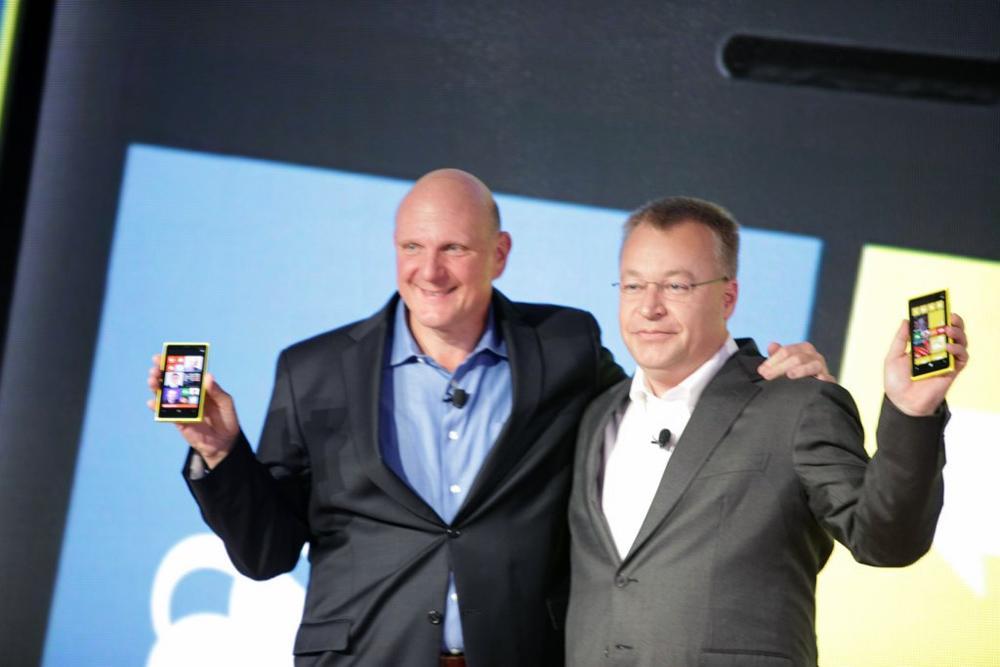
Two years ago, Microsoft and Nokia came together to form a "strategic partnership" that saw Nokia adopt Windows Phone as its preferred smartphone platform. Fast-forward to today and the two companies have announced that they'll soon be getting even cozier.
Microsoft and Nokia
announced tonight Microsoft has agreed to acquire Nokia's Devices & Services division, the part of the Finnish firm that's responsible for cranking out its Lumia line of Windows Phone hardware as well as the Asha line of handsets. The deal will see Microsoft pony up
3.79 billion Euros (~$5 billion USD) in order to purchase "substantially all" of Nokia's Devices & Services division and 1.65 billion Euros (~$2.2 billion USD) to license its patents. Microsoft also plans to license and use Nokia's mapping services.The deal is subject to approval from the usual regulatory entities as well as Nokia's shareholders and its expected to close in the first quarter of 2014. Once the deal is done, Nokia expects that executives Stephen Elop, Jo Harlow, Juha Putkiranta, Timo Toikkanen, and Chris Weber will all make the move over to Microsoft. Stephen Elop has revealed that following the announcement of today's deal, he will leave his post as Nokia CEO to become Nokia Executive Vice President of Devices & Services. Risto Siilasmaa, chairman of Nokia's board of directors, has been named interim CEO.
Once its Devices & Services division is integrated into Microsoft, Nokia will be left with
its NSN infrastructure business, HERE mapping and location services and Advanced Technologies, a group responsible for tech development and licensing. Nokia has agreed to grant Microsoft a 10-year non-exclusive license to its patent portfolio as well as a four-year license to its HERE platform. In exchange, Microsoft will grant Nokia rights to the HERE services.
Rumblings of a potential deal involving Microsoft and Nokia's Devices & Services arm
surfaced back in June, but at the time it was said that the talks had hit a snag. It looks like the two companies were able to clear things up, though, and now they're coming together in a major mobile deal. Nokia has been by far the biggest player in Windows Phone for most of the platform's life, and while the WP8 is still lagging behind Android and iOS in terms of market share,
it has been gaining a foothold in the global smartphone battle royale.
We'll have to wait and see exactly what kind of fruit this new relationship will bear, but with Nokia's Lumia hardware group joining a Microsoft that has quite a bit of cash and is responsible for the Surface tablets, it'll be interesting to see what these two firms come up with. Another thing to watch will be which Windows Phone manufacturers not named "Nokia" (like Samsung, HTC and Huawei) end up sticking with the platform now that Microsoft owns its biggest player. What do you think of this Microsoft-Nokia deal? Is it smart for Microsoft to acquire Nokia's hardware business?
UPDATE: Microsoft has posted a lengthy PowerPoint presentation explaining its rationale for acquiring Nokia's Devices & Services division. Among the many reasons given, Microsoft says that it can't allow Apple or Google to "foreclose app innovation, integration, distribution, or economics." The Redmond firm also believes that it needs a "first-rate Microsoft phone experience" for consumers and that success in phones will lead to success in tablets, which will then help out its PC business.
Looking forward, Microsoft is confident about the deal's odds of gaining approval, saying that it will help to create more competitive alternatives to Apple and Google and give consumers more choice. Microsoft also promises that it's committed to working with partners in both the Windows and Windows Phone platforms. A link to the full "Strategic Rationale" document can be found below.
